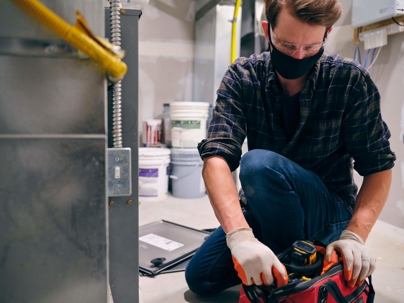Even though most people would rather put off a heating repair or replacement, there are some “red flags” that you just shouldn’t ignore. If you notice your furnace giving these warning signs, it’s time to call a technician.
The furnace flame is yellow or orange.
A good furnace flame should be bright blue in color. If your furnace is burning yellow or orange, this could indicate the furnace is not distributing the correct ratio of gas and oxygen to the burners. It could also mean that the burners are grimy and need to be cleaned. In any case, it’s time to have the system serviced right away.
The pilot light won't stay on.
This tends to be an issue in older furnaces, as many newer furnaces don't have a standing pilot light. This problem may be due to a blocked gas line, inadequate gas flow, or a malfunctioning thermocouple. All of these issues require an experienced technician to diagnose and resolve.
Your furnace makes loud noises.
Most furnaces will make some noise when they are running, but if your furnace has started making louder-than-normal sounds like banging or clanking, it could be a sign that some of the parts are wearing down or need to be replaced.
A boom when the furnace starts up can be an especially concerning sound because it indicates a problem with delayed ignition: gas isn't igniting in your furnace as quickly as it should, and when it finally does, it's creating a small explosion. The pressure from these mini-explosions can end up damaging your heat exchanger, the component that prevents your furnace's toxic flue gases from mixing with your home's "breathing air."
The furnace's heat exchanger or flue is starting to rust.
Your furnace's heat exchanger and flue are metal components that separate the air in your home from the toxic flue gases created by combustion. Over time, these components can start to corrode and rust, which makes them prone to cracking.
Once a crack forms, poisonous gases can start leaking into your home's air supply. So if you notice rust around your furnace, it’s time to call a technician for an inspection before any further damage occurs.
The furnace cycles on and off before fully heating your home.
If your furnace keeps turning on and off shortly after it starts, this is called “short-cycling,” and it's a common sign that the unit is not working correctly. This could be due to a dirty air filter, a malfunctioning thermostat, or some other issue, like a dying fan motor.
You can perform some basic troubleshooting yourself, like replacing the air filter and checking to make sure all of your home's vents are open and that nothing is blocking them. You can also try replacing your thermostat's batteries (if it has them) or updating the thermostat's software (if it's a Wi-Fi-enabled thermostat). If these steps fail, it's best to contact a technician.
Water is leaking around your furnace.
If you’ve noticed water around your furnace, it could be a sign that the condensate line is blocked or clogged. The condensate line is a drain pipe that's responsible for diverting moisture away from your furnace. Over time, dirt, minerals, and even mold can clog this pipe and cause water to back up and leak around your furnace.
This issue should be addressed as soon as possible, and a professional should be called to inspect and clear the condensate line. Otherwise, you could end up with a lot of water damage to repair.
In some cases, the technician may need to upgrade your drain line. This can be necessary if you've recently installed a high-efficiency heating system, which tends to pull a lot more moisture out of the air than an older, less-efficient system. It may be possible that your older drain line is not adequate to handle your new system's bigger drainage demands.
Heating Services in Dallas, TX
If you’re experiencing any of these warning signs, it’s time to call a heating specialist from Rescue Air and Plumbing and have your furnace inspected. The sooner you get the repair made, the more time—and money—you can save in the long run. Call us today at (972) 201-3253!

